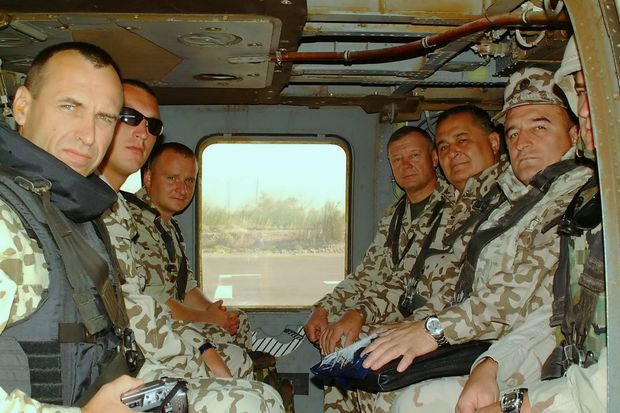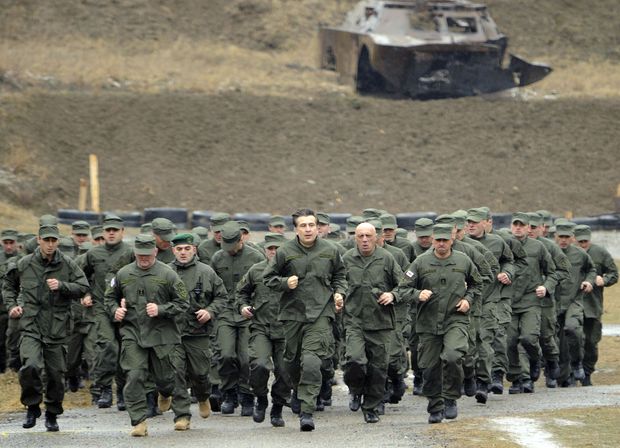“A system cannot change itself – leaders are needed”
Bacho Korchilava on Ukrainian-Georgian parallels
Bacho Korchilava is known in Ukraine as journalist, blogger, analyst, ex-spokesman of the Georgian Embassy in Ukraine, and participant in the 1992-93 Abkhazia war. After school he became a military serviceman and, a year later, went to war. Then he joined the law-enforcement bodies and worked there for six years during Eduard Shevardnadze’s presidency. Only then did he take to journalism. When Mikheil Saakashvili came to power, he was one of his harshest critics. By the end of 2004 he had understood that major reforms were being carried out in the country and, as he says himself, became calmer. As a journalist, Korchilava actively broached such topics as foreign policy, the ministry of defense, and army reforms. No wonder he was made an offer to work on changing the image of Georgia in Ukraine. We talked with Korchilava about such things as similarity of the informational and real Russian-Ukrainian and Russian-Georgian wars, how Saakashvili managed to have 5,000 corruptionists put behind bars, why politicians should take into account the “social needs” of society, and the importance of “feedback” between the president and journalists.
“The Ukrainian informational space and journalism have been staying for a long time in the Russian reference frame. Our neighbor’s mass media tend to conduct publicity campaigns which we often fall victim to. We did not pay attention to this because it did not concern us directly. We came across this several times during the ‘gas wars,’ but the Ukrainian media showed complete unawareness of what was to be done in this situation. It also took Georgia a long time to grasp this. But in 2008 we and the West won a clear victory over Russia in the informational war.”

MIKHEIL SAAKASHVILI (CENTER) AND LIEUTENANT-GENERAL DEVI CHANKVETADZE, CHIEF OF THE GENERAL STAFF OF THE GEORGIAN ARMED FORCES (TO THE RIGHT OF SAAKASHVILI), TRAINING TOGETHER WITH SOLDIERS IN 2007 / REUTERS photo
Were the Georgian media criticizing Saakashvili at the time?
“There was a moratorium on criticizing the president. In general, the Georgian media have got used to living a very free life. Many journalists can call ministers right on their cell phones. The position of a spokesperson is much less important there than in Ukraine. But when war broke out in Georgia, the media as well as the opposition refused to criticize the government.”
Voluntarily?
“Yes. But, at the same time, they said that if there were a negative result all the blame would fall on the government. They gave the government all mechanisms for work but also laid the responsibility on it. This result can be called neither positive nor negative, but it was crystal clear that our actions were caused by Russia’s attack. It is not so much about the media and politicians as about maturity of society. In Ukraine, society has been forming for 20-something years, but is still very young. But in Georgia, all these cataclysms, conflicts, and wars began at the very outset of independence – so we managed to grow up.”
“JOURNALISTS SHOULD MAKE FRIENDS WITH THE FOREIGN MINISTRY”
You were press attache at the Georgian Embassy in Ukraine and “know the diplomatic ropes.” What is the extent to which Ukrainian media reports on all kinds of agreements and meetings are true to fact?
“It depends on how adequately you work. When I worked in the media, we often mingled with diplomats, ministers, and their deputies. It is very important to know certain inside information, not only the general political situation. What we call “information leak” is formally called “access to information” in the West. The foreign ministry should be cautious and judicious in disclosing confidential information. There are attempts – unprofessional so far – to do so in Ukraine. Aware of certain closeness in this institution, journalists begin to search for negative aspects. But journalists should make friends with this ministry, as far as foreign policy is concerned. Very much depends on the public opinion they shape inside and outside the country. All over the world, many embassy spokespersons arrange informal meetings and stay in touch with journalists. Unfortunately, the Ukrainian Foreign Ministry’s press center has now turned into a ‘crazy printer’ that produces press releases. All interesting things lie deeper. For example, I know a lot of stories about Shevardnadze from our foreign ministry. Naturally, I then asked Shevardnadze whether they were true, and he either confirmed them or said that something was embellished.”
Many criticize the format “one journalist from a TV channel for an interview with the president.” What do you think of this? Or the format does not matter when it comes to interviewing the head of state?
“The president cannot answer questions from the public every day, but these questions are always there. We should choose a format for communication. I don’t need at all to see the president on television daily. We have Sviatoslav Tseholko who is to contact the media daily, answer ticklish questions, and serve as ‘feedback.’ Then journalists may wish to keep saying: ‘Please speak to the country.’ But, maybe, Ukraine is afraid to cultivate this kind of people. There is obviously a fear that they will become influential.”
“UKRAINE NEEDS REFORMS AND NEW RULES OF THE GAME”
With account of the Ukrainian context, what can Ukrainian reformers borrow today from Georgian experience?
“When a country leads a hard life and this cannot last long, it begins to change something – this is what we call reforms. Written laws, chats, or opinions alone cannot bring about changes. This can only be done by a team or a political force that takes on responsibility and works. A system cannot change itself. Some ‘madmen’ are needed. Georgia did not have a united political team either. At the first stage, some of the ministers were from the team of Nino Burdzhanadze and Zurab Zhvania, others from Saakashvili’s team. Kakha Bendukidze, for example, did not belong to any political team at all. But they were like-minded people in terms of vision. Society was eager to see the country changed qualitatively, and politicians began to do this. For reforms can only be carried out from above, not from below, the middle or aside. The same is occurring in Ukraine. Society is well aware that Ukraine needs reforms and new easy-to-grasp rules of the game. But Georgian politicians were more fearful at the time, whereas their Ukrainian counterparts are more interested in reformatting the social demand. They will fail to do so. They may be saying there’s a war going on, but they will still have to get back to this problem. This is also a question of maturity. Politicians are accustomed to the Soviet practice of receiving a command from above. For instance, there was a command to rewrite all the signboards – so they would rush to rewrite them all. And now they need to understand that there’s no Moscow and there is Kyiv and they must do what the people are saying to them.”
Ukraine has a new “trend” now – anticorruption and lustration committees. These were also set up in Georgia but did not catch on. Overall 1,500 corruptionists ended up behind bars thanks to the reformed ministry of the interior, not the anticorruption committee.
“The anticorruption committee is a misplaced idea. They may exist in some countries, but in the case of Georgia they only duplicated the functions of other institutions. Whenever the Rustavi 2 TV channel showed the caption card of the ‘Courier’ evening program, I always laughed: about 20 people were laid up with a heart attack because TV would say each time that 5-10 people were arrested for corruption. Business turned white, taxes went down, but, at the same time, there was strict control. You can’t possibly fight corruption by way of campaigns – fight for two months and drop it. When the segments of a system are being reformed, the system becomes always intent on combating corruption. If the interior ministry is to be reformed, it will be doing what it must do under the law. The prosecutor general’s office must also fight corruption. For it is not written in any law that corruption is a boon and should be encouraged.”
What features should an official have to be able to carry out reforms?
“These offices should be held by the people who have access to the president and whose word matters to him or her. Any minister is a political figure. At the same time, they should have a strong character in order to bring things into motion at the first stage before a real system has been established. The president must be a political cover for these ministers. As for the lower-level people, such as deputy minister, chief of the General Staff, or prosecutor general, they must be true professionals. Yet the present-day Defense Ministry of Ukraine has such a structure that it needs a career military officer as minister in this transitional period, as was the case in Georgia. Ukrainian politicians begin to talk about strategic things, then slide to tactics, and go to nowhere.
“We have a lot of bureaucrats who are poorly educated and have a vague idea of the process. In general, outdated education is a problem in any field. I often come across Ukrainian diplomats. I recently spoke to the Ukrainian diplomats who work at the embassy in Azerbaijan. They are losing the information war over there. One must not be afraid. We, Georgian diplomats, once had to haunt the doorways of Ukrainian officials and ‘din into their ears,’ but, as a result, they were doing what we needed. The same applies to Ukraine. Whenever a country is in a state of war, everyone should work as efficiently as possible.”
“UKRAINE HAS FAR MORE PROSPECTS TO BUILD SOMETHING”
“Ukrainians and Georgians are in dire straits now. Figuratively speaking, we left Point A but have not yet arrived at Point B. We are on the same way, but one of us has gone a little ahead and the other is a bit lagging behind. There are clear-cut benchmarks for which we are heading. But, by contrast with Georgia, even the broad circles of Ukrainian society are still to come to an agreement on benchmarks. There was a referendum in Georgia in the late 1990s, when 80 percent of the population voted for joining NATO. But the reasons why we make the same blunders will be much fewer five years later and none at all in 30 years’ time. Ukrainian society is more law-abiding and closely-knit than the Georgian one. This country has far more prospects to build something than any other country. It is not without reason that the GUAM (Georgia, Ukraine, Azerbaijan, Moldova) organization was set up in 1997 with US assistance. Ukraine was to assume the role of leader in this organization. Unfortunately, your country has lost this role for some time, but I think the situation will improve and Ukraine will still be a regional leader in the Caspian-Black Sea region – of course, if it still has an understanding and a desire to change.”






